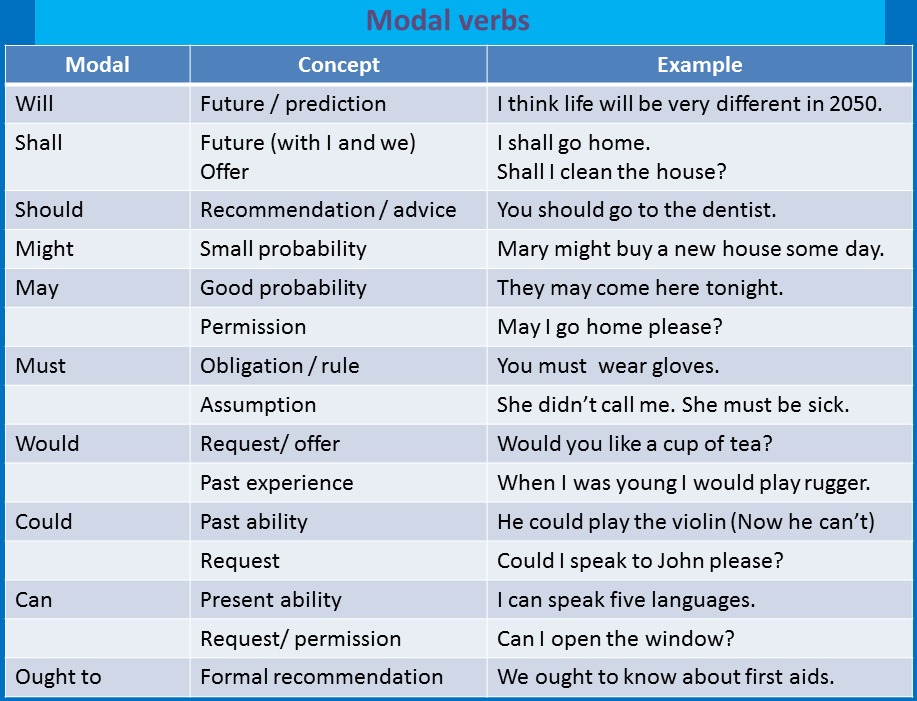
🎓 طالب ثانوي وتفكر بمستقبلك؟
🚀 الآن أفضل وقت تبدأ تتعلم مهارة التسويق الرقمي
مجال مطلوب عالميًا برواتب عالية وفرص لا تنتهي.
الأفعال المُلحَقة Will Would و Shall Should

* الأفعال (will, would, shall, should, can, could, may, might, and must) لا يمكن أن تأتي كأفعال أساسية ، ولا تأتي إلا أفعالاً مُلحَقة فقط ، ولا بد أن يسبقها فعل أساسي .
Will
1- تُستخدم للتعبير عن الرغبة أو التفضيل أو الاختيار أو الموافقة .
أمثلة :
I will take this duty.
Will you stop talking like that?
2- تُستخدم للتعبير عن المستقبل .
أمثلة :
It will rain tomorrow.
The news will spread soon.
3- تُستخدم للتعبير عن الطاقة أو القدرة .
أمثلة :
This bucket will hold two gallons of water.
This airplane will take 200 passengers.
4- تُستخدم للتعبير عن العزم والإصرار والتصميم .
مثال :
I will do it as you say.
Would (ماضي will)
1- تُستخدم غالبًا كفعل مساعد مع (rather) للتعبير عن التفضيل .
أمثلة :
I would rather go shopping today.
We’d rather say something than stay quiet.
2- تُستخدم للتعبير عن أُمنية أو رغبة .
مثال :
I would like to have one more pencil.
3- تُستخدم للتعبير عن الاحتمال والإمكانية .
مثال :
If I were you, I would be so happy.
4- تُستخدم للتعبير عن العادات والأفعال الروتينية .
مثال :
Normally, we would work until 6 p.m.
Shall
1- تُستخدم بصورة أساسية في اللهجة الأمريكية (American English) للسؤال بأدب .
ولها استخدامات أكثر في اللهجة البريطانية (British English) .
* وتُستخدم will أكثر من shall للتعبير عن زمن المستقبل في اللهجة الأمريكية .
أمثلة :
Shall we dance?
Shall I go now?
Let’s drink, shall we?
2- تُستخدم غالبًا في الإجراءات الرسمية للإلزام أو الحاجة .
أمثلة :
You shall abide by the law.
There shall be no trespassing on this property.
Students shall not enter this room.
Should (ماضي shall)
1- تُستخدم غالبًا كفعل مساعد للتعبير عن الرأي أو الاقتراح أو التفضيل أو لطرح فكرة .
أمثلة :
You should rest at home today.
I should take a bus this time.
He should be more thoughtful in the decision-making process.
2- تُستخدم للتعبير عن تمني حدوث نقيض شيء قد حدث بالفعل .
وتُستخدم كالتالي : (التصريف الثالث + have + should) .
أمثلة :
You should have seen it. It was really beautiful.
I should have completed it earlier to meet the deadline.
We should have visited the place on the way.
3- تُستخدم لطلب رأي شخص ما .
أمثلة :
What should we do now?
Should we continue our meeting?
Should we go this way?
Where should we go this summer?
4- تُستخدم لقول شيء صحيح أو متوقَّع .
أمثلة :
There should be an old city hall building here.
Everybody should arrive by 6 p.m.
We should be there this evening.
(اختبار 20.1)
املأ الفراغات مستخدمًا الفعل المساعد المناسب :
1) I leave now. It is too late.
2) You have seen him. His dance was amazing.
3) we have lunch together?
4) I like a cup of tea, please.
5) we read the email?
لا يوجد تعليقات جديدة